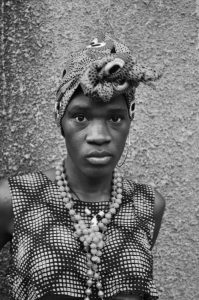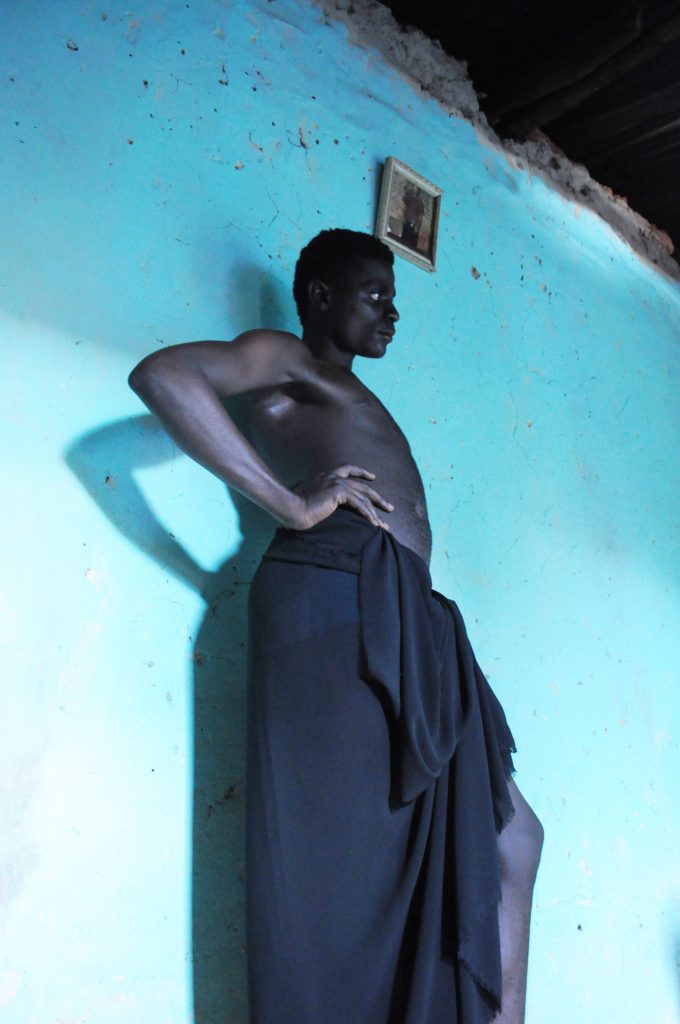(THIS ARTICLE IS MACHINE TRANSLATED by Google from Norwegian)
"Being gay in Uganda is not easy, but it is possible to survive. You risk losing your job, being thrown out of the apartment and being ostracized by the family, but still I don't think Uganda is worse than most other African countries. We risk usually not to be killed, as in Nigeria or South Africa, where on paper they have Africa's most liberal constitution. " Ambrozio Barigye is a field worker and journalist for the Kuchu Times, a media organization that works to improve the situation of gays and transgender people in Uganda. The word Kuchu can be translated as "queer" in Luganda, the language spoken in the capital Kampala, and is used derogatory of anyone who does not fit into the "normal" category. Uganda has also been condemned internationally in recent years for its treatment of gays and transgender people, and a large number of Ugandans have fled – either to neighboring countries or to the West – to escape harassment and prosecution in their home countries. But does Uganda really deserve the monstrous stamp the country has received from Western media? At least there are many gays and transgender people living an open life in the bigger cities, especially in Kampala – but they live a difficult life on the constant edge of the law.

Homophobia. Uganda came seriously on the world map when President Museveni attempted to introduce an extremely strict anti-homosexual penal code ("AHA") in 2014. Like most other former British colonies, the country has inherited a criminal law that criminalizes homosexuality, and in conservative African and Asian countries this legislation has been enforced to a greater or lesser extent. Polls show that the vast majority of Africans view homophily as somewhat unnatural and unchristian, and homophobia is generally very prevalent in the population – but the topic has been little discussed publicly. That has changed in recent years after a number of evangelical pastors, including some from the United States, began organizing seminars to warn against gay men raping children and trying to recruit young boys into "gay organizations." At this time, tabloid newspapers began regularly publishing names of suspected homosexuals, making activists such as Barigye extremely vulnerable. "I've had my name published in the newspapers three or four times despite being a family man with wife and children, and that means I can no longer get regular jobs," he says. In the most infamous case, Rolling Stone magazine published a list of names and addresses of over 100 people they accused of being gay, under the title "Hang them!". A few months later, well-known activist David Kato was killed in his own home, an act that has been linked to the revelations in Rolling Stone.
Fleeing. In this heated climate, the government presented a bill that included the death penalty for homosexual offenses committed under aggravated circumstances, and up to life in prison for less serious acts. They would also make it a criminal offense to work for the rights of gays and transgender people. Uganda received massive international criticism when the law was passed in Parliament. Norwegian Foreign Minister Børge Brende called the bill a violation of "so fundamental human rights that Norway must send a signal; "here goes the limit," and withheld NOK 50 million in aid. It all ended with Uganda's Supreme Court calling the new law unconstitutional, and canceling it a short time later. Ambrozio Barigye believes that Museveni – who has been president for 30 years – was aware that the law would not be approved, but wanted to use his attention to show the muscle and uncompromisingness of Western countries, thus garnering support from Ugandans. The uproar around the bill led to increased awareness of homosexuality in Uganda, but also led to a sharp increase in attacks on anyone who could be labeled as different. Many felt compelled to move from their home to escape persecution.
A large number of gay Ugandans have fled to Kenya. The dream for many is to get refugee status from the UN and eventually settle in a western country – a process that takes years and only a small minority succeeds. Most who manage to get to the West are either smuggled across the Mediterranean or arrive on a tourist visa before jumping off. Figures from the UDI show that 41 of 49 Ugandan asylum seekers who came to Norway between 2013 and 2015 stated their gay orientation as asylum grounds.
Gerald Sentongo was active in the gay movement in Uganda, and fled to Norway when the umbrella organization he worked for in Kampala, SMUG (Sexual Minorities Uganda), was stealing sensitive personal information about employees and members. "The information contained in the data would have allowed the authorities to prosecute all of us who worked in SMUG, so I fled to Norway. It is no longer possible for me to live in Uganda. I am married to a man – where would I live with him? The majority of the population is still strongly opposed to homosexuality, as they are very religious and have conservative values. ”
Must prostitute. According to Nate Freeman, an American lawyer who works with free legal aid for gays and prostitutes in Uganda, violence and the threat of arrest are not the biggest problem for gays. First and foremost, the problem is the lack of support from the family and the community. Uganda has a culture that places great emphasis on the family, which counts on average six children. The pressure to contribute financially to the family is great, and family networks are used to find work, housing or study funding. For many in Kampala, the family at home is one last lifeline if one loses the job. Unemployment among young Ugandans is sky high, but most have the opportunity to return to the village and survive with the help of the family's land, thanks to Uganda's rich soil and friendly climate. Homosexuals who are frozen out of the family completely lose this network, while at the same time having difficulty finding other jobs. “Skew activists really appreciate the support they receive from abroad, but what they most need is financial opportunities in Uganda. After being kicked out of the family, many have to resort to prostitution to feed themselves, ”Freeman says.

Threats social order. When Freeman's organization helps those arrested, it is often about ensuring that existing legislation is complied with. "We take care that people are not held in custody longer than the law allows, and that they get a lawyer when their case comes to court," he says. There are very few who are actually convicted, since the evidence requirement in such cases is high. Paragraph 145 of the Ugandan Penal Code prohibits "carnal conduct in violation of the laws of nature", but this is difficult to prove unless taken on fresh deed. According to Freeman, the courts in Uganda are far more independent than one would think. "They have largely been convicted in favor of LGBT people when their cases first come to court. They also made sure that Rolling Stone magazine had to be shut down after two activists who had been named sued the newspaper's owner. ”Rather, the major challenge for Freeman comes from the government's aggressive counteraction of organizations working for LGBT rights. "Sexual minorities represent a huge and highly visible challenge to the status quo, and authoritarian governments, like Uganda, feel threatened by this," Freeman says.
"She ended up in the hospital with a broken larynx, but the police would not help her. They said she was guilty of the attack herself because of the way she lives. "

Denied HIV treatment. One consequence of the authorities' hostile attitude is that hate crime against sexual minorities is usually not investigated by the police. The organization SMUG recently launched a report of violence committed after Museveni's controversial law was canceled in 2014. Over a period of one and a half years, they documented 264 cases of persecution and harassment in Uganda, including 35 cases of physical violence and 13 cases of torture committed by the police. Adams Mary, a trans woman who heads the Foundation for Transwomen Living With HIV in Kampala, is all too familiar with the challenges involved. "As a transgender, living in Uganda is very, very difficult. For gays it is a little easier to live unnoticed; I can't move outdoors without people staring at me and shouting comments at me. I'm always scared when I'm out on the street, ”she says. Adams was evicted from home when her family found out that she was wearing women's clothing in hiding, and had not been in contact with them for over 10 years. As a trans person in Kampala, it is virtually impossible to get legal work, and like many others in the same situation, Adam sells sex to survive. “My clients are almost exclusively foreign men, whom I meet at the finer hotels in Kampala. I don't trust Ugandans – they are believers to deny me payment or report me to the police afterwards, ”she explains.
Adams does not live with HIV himself, but works to help HIV-positive trans people in Uganda. They often find that health professionals refuse them legal treatment, such as vital ARV medicines that help keep the virus at bay. “Everything got worse for us after the bill first appeared in 2009. Before that time there was so little knowledge of odd people in Uganda anyway – most did not know what we were for. In the years that followed, the violence and harassment by the police has become much worse, ”she says. She has been attacked several times, usually unprovoked on the open street, and one of her close friends recently received so much beating that she barely escaped it with her life preserved. "She ended up in the hospital with a broken larynx, but the police would not help her. They said she was guilty of the attack herself because of the way she lives. As a sex worker, I live in constant fear of being arrested by the police, but as a rule I have managed to bribe them enough to let me go. If I get arrested, I'm afraid of being raped by the other inmates, ”Adams says.
A double-edged sword. Adams believes that Western countries must continue to put pressure on Uganda's government regarding the rights of sexual minorities. One positive effect of the attention on homosexuality in recent years has been that it has become easier to talk about the topic and focus on the LGBT people's freedom struggle. Now people know what it is, even though the vast majority are still strongly opposed to it, and although the attention itself has also led to more acts of violence. "We have to talk about this, if things will never get better for us here in the country," Adams says. "Although I love Uganda, it is too difficult for me to live here now. My dream is to be able to escape to Europe – even if it means selling sex for the next five years to save enough money for the trip. ”
Håvard Bergo works for Trac FM in Uganda, a media organization aimed at East Africa and Somalia. He also writes political risk analysis and is the editor of Global Risk Insights.
havard.bergo@gmail.com


